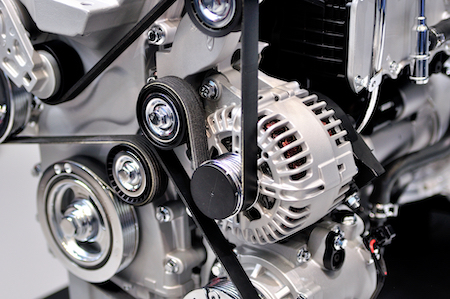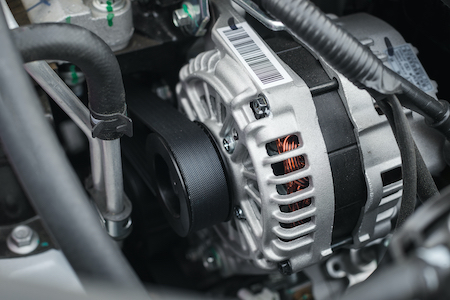If you own a car, you already know that your car’s electrical system plays a vital role in keeping your vehicle functional. At the core of the electrical system is the alternator, one of the most critical components in keeping your vehicle’s electrical system performing correctly.
Yet as a driver, you might not know much about the alternator. What does it do? What signals should you watch for and correct before it fails altogether?
What is an alternator?
Simply put, an alternator is a device that converts mechanical energy into electrical energy. The engine powers it and ensures that the battery remains charged. It also maintains a stable voltage supply to other electrical components in your vehicle.
The alternator is usually located near the engine. It creates electrical energy from mechanical energy with an alternating current. It’s created from several components, including:
- A voltage regulator to prevent power surges
- A stator and rotor to produce alternating current to convert energy into electricity
- A cooling fan to protect the various parts from overheating
How does an alternator work?
The alternator takes the mechanical energy the engine generates through motion and turns it into electrical energy. This process is achieved using a rotor and a stator within the alternator. The rotor is a magnetic field created by a copper coil that spins along with the engine belt. The stator sits beside the rotor, takes the rotating magnetic field and uses it to produce an electrical current. Once the electrical current is generated, it flows through the car’s electrical system, powering the lights, radio, and other electrical components.
How long does an alternator last?
Like other components on a vehicle, the alternator will only last for so long. The lifespan of an alternator may vary depending on the make and model of your vehicle and how often you use it.
On average, alternators tend to last between five to seven years. However, if your alternator isn’t working right, it may be worth inspecting it to see if it needs replacement. If your alternator stops functioning, it could drain your car’s battery or lead to a much larger electrical failure that could wind up being a costly fix.
What symptoms surface when an alternator fails?
Several signs indicate an alternator is failing or has failed. The most common warning sign is your car battery warning light illuminating your dashboard. This light signals that an issue has arisen within the electrical system that needs attention. Other symptoms may include your car struggling to start or irregular noises or smells. If you notice these symptoms, you should get your vehicle to a mechanic as soon as possible.
Weak battery
As the alternator’s ability to charge the battery decreases, it will eventually lose its charge and weaken. This may cause the engine to struggle or even fail to start altogether.
Battery dashboard light on
A common indicator of a failing alternator is the battery dashboard light. If this light illuminates, the alternator is not charging the battery properly, and the battery is being drained.
Grinding noise
A failing alternator can also produce a grinding noise. This noise can be caused by worn bearings or failing internal parts. If the stator and rotor don’t spin correctly, they may produce an unpleasant sound.
Dim or slow-working electrical components
If the alternator is not providing enough power to the electrical system, the car’s components, such as headlights, radio, and air conditioning, may operate at lower capacity or slow down. This can also include other systems like power windows or door locks
Flickering or pulsating headlights
A failing alternator may cause the headlights to flicker or pulse, as the alternator is not providing a consistent flow of electricity to the car’s electrical system.
Burning rubber smell
A worn-out alternator belt or a failing alternator pulley can cause a burning rubber smell. This indicates the belt or pulley is overheating due to excessive friction.
Stalling or hesitation
A weak or failing alternator can cause the engine to stall or hesitate, as the spark plugs may not receive enough power to ignite the fuel and air mixture in the combustion chamber.
Any of these symptoms should be taken seriously and should prompt you to have your vehicle inspected by a qualified mechanic. An alternator that is not functioning properly can lead to a drained battery, which can leave you stranded, and cause other issues down the road if not addressed.
How do you fix an alternator?
A qualified mechanic should always carry out the repair or replacement of an alternator. Ensure they have experience working on automotive electrical systems.
Before replacing an alternator, the mechanic will perform a series of diagnostic tests to determine the cause of the issue. This may include testing the battery, checking the alternator’s voltage output, and inspecting the alternator belt and pulley.
Depending on the results of the diagnostic tests, the mechanic may be able to repair the alternator by replacing faulty components such as the voltage regulator or bearings. If the alternator cannot be repaired, it must be replaced with a new or rebuilt unit.
After the installation, the mechanic will perform a series of tests to ensure the alternator functions properly. This may include checking the voltage output, inspecting the battery’s charge level, and verifying that all electrical components work as they should.
Easy peasy, and it shouldn’t take much time. You’ll be back on the road in no time.
Have you ever had a problem with an alternator?
While an alternator may not be a component you work with regularly, it’s crucial to your vehicle’s construction. As it fails, your car will show visible signs of failure.
The alternator is a critical element in how your car runs, and it is vital to know when it is showing signs of wear and tear or failing altogether. Knowing what an alternator is and how it works can be very helpful when talking to a mechanic about the issues you may be experiencing.
Keep an eye out for warning signs, and if you ever feel unsure about anything, it’s always best to take your vehicle to a mechanic to get a proper diagnosis. You can avoid costly fees and expenses by staying on top of your car’s electrical system and ensuring the alternator is doing its job.


 Inside is a voltage regulator that monitors the battery charge. As the battery runs low, the alternator supplies a power source to ensure it stays running. Without the two working together, your car wouldn’t run.
Inside is a voltage regulator that monitors the battery charge. As the battery runs low, the alternator supplies a power source to ensure it stays running. Without the two working together, your car wouldn’t run.